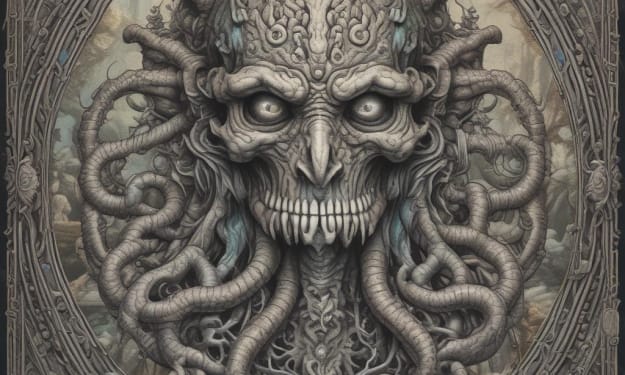'Quiet' Borderline Personality Disorder
"People with 'quiet' BPD will still experience the intense emotional roller-coaster than distinguishes the disorder, but will often be working harder to shut these emotions down, or push them aside."

Please do not read if you feel like you may have a negative reaction to reading about mental illness.
No one ever talks about borderline personality disorder, let alone “quiet” BPD, and, to be quite honest, it makes me feel extremely invalidated and pushed to the side. Not a lot of people even know what it is. BPD is “a pervasive pattern of instability of interpersonal relationships, self-image, and affects, and marked impulsivity beginning by early adulthood and present in a variety of contexts, as indicated by five (or more) of the following:
- frantic efforts to avoid real or imagined abandonment. Note: Do not include suicidal or self-mutilating behavior covered in Criterion 5.
- a pattern of unstable and intense interpersonal relationships characterized by alternating between extremes of idealization and devaluation
- identity disturbance: markedly and persistently unstable self image or sense of self
- impulsivity in at least two areas that are potentially self-damaging (e.g., spending, sex, substance abuse, reckless driving, binge eating). Note: Do not include suicidal or self-mutilating behavior covered in Criterion 5.
- recurrent suicidal behavior, gestures, or threats, or self-mutilating behavior
- affective instability due to a marked reactivity of mood (e.g., intense episodic dysphoria, irritability, or anxiety usually lasting a few hours and only rarely more than a few days)
- chronic feelings of emptiness
- inappropriate, intense anger or difficulty controlling anger (e.g., frequent displays of temper, constant anger, recurrent physical fights)
- transient, stress-related paranoid ideation or severe dissociative symptoms”
I have 8/9 of these criteria. I was diagnosed about 1 year ago with BPD, and with further research discovered that I suffer from “quiet” BPD. This means that instead of experiencing Criterion #8, I internalize all the violent emotions.
“[T]hose with ‘quiet’ borderline personality disorder act in,” says Dr. Gerard Lawson, President of the American Counseling Association. “There is less hostility and fewer aggressive outbursts, but there may still be isolation, and self-injurious behaviors or suicide attempts.”
People with “quiet” BPD will still experience the intense emotional roller-coaster than distinguishes the disorder, but will often be working harder to shut these emotions down, or push them aside. Very often, their sense of self is marked by shame or self-hatred.
“People with BPD often feel that their emotions are ‘wrong’ and spend a great deal of energy either pushing their feelings down or trying to justify [them],” explains Jessica Tappana, LCSW, therapist and owner of Aspire Counseling. “Whether you react by withdrawing (“quiet”) or acting out....”
To be blunt... living with “quiet” BPD is a nightmare. I am convinced everyone who is in my life is playing an elaborate prank by saying they care about me, and that they are one day going to abandon me together. I have intense mood swings, disassociate, become extremely emotional at the smallest of things (to my immense confusion), I continuously find myself “looking” for the ways people hate me (so I can avoid the inevitable crushing devastation of the group abandonment), I feel lonely all the time even seconds after I leave a friend’s house, have really awful anxiety about what people think of me and my mental illnesses, and then of course there is my past of self harm and suicide attempts and ideations.
Dialectical Behavior Therapy was developed by Dr. Marsha Linehan, who has BPD, because there was no treatment existing for it at the time. I am so grateful to be learning skills to help... but I do often feel that I am too screwed by the BPD Bio-Social Theory for DBT to even make a dent. The BPD Bio-Social Theory is the theory that BPD “emerges from transactions between individuals with biological vulnerabilities and specific environmental influences.” What this means is, I have BPD partly because of my genetics, and partly because of the environments I was a part of growing up.
When I was diagnosed with BPD I was half relieved, and half chaotically upset. Relieved because I finally had a name for what was going on in my brain. Upset because, “Great... another thing wrong me.”
I don’t often specify the BPD when I talk to people about my mental health, and that’s because no one can really relate to it, or they have a misconception about what personality disorders are. There are many different types of BPD, and nowadays there are lots of different therapies to help combat it. I am learning skills to help myself, but I am also still very depressed, empty, lonely, and terrified that nothing is going to help me.
I wanted to write this because I think it’s a good idea to be comfortable while talking about mental illnesses, and I wanted to share more about my journey and how I’m currently feeling. I honestly feel like everyone forgets about my poor mental health, and now you know why. I’m keeping it “quiet.”
https://www.google.com/amp/s/www.psychologytoday.com/us/blog/here-there-and-everywhere/201112/borderline-personality-disorder-big-changes-in-the-dsm-5%3famp
https://www.talkspace.com/blog/2018/01/what-is-quiet-borderline-personality-disorder/
https://www.ncbi.nlm.nih.gov/pmc/articles/PMC2696274/
About the Creator
Siena Dini
instagram: @sienadini






Comments
There are no comments for this story
Be the first to respond and start the conversation.